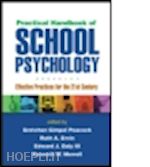I. The School Psychologist as a Problem Solver: Establishing a Foundation and a Vision1. The School Psychologist as a Problem Solver in the 21st Century: Rationale and Role Definition, Ruth A. Ervin, Gretchen Gimpel Peacock, and Kenneth W. Merrell2. Choosing Targets for Assessment and Intervention: Improving Important Student Outcomes, Renee O. Hawkins, David W. Barnett, Julie Q. Morrison, and Shobana Musti-RaoII. Assessment and Analysis: Focus on Academic Outcomes3. Analysis of Universal Academic Data to Plan, Implement, and Evaluate Schoolwide Improvement, Amanda M. VanDerHeyden4. Assessment of Cognitive Abilities and Cognitive Processes: Issues, Applications, and Fit within a Problem-Solving Model, Randy G. Floyd5. Assessment of Academic Skills in Reading within a Problem-Solving Model, Amanda M. Marcotte and John M. Hintze6. Assessment of Academic Skills in Math within a Problem-Solving Model, Matthew K. Burns and David A. Klingbeil7. Assessment of Academic Skills in Written Expression within a Problem-Solving Model, Kristin A. Gansle and George H. Noell8. Selecting Academic Interventions for Individual Students, Edward J. Daly III, Kristi L. Hofstadter, Rebecca S. Martinez, and Melissa AndersenIII. Assessment and Analysis: Focus on Social Emotional and Behavioral Outcomes9. Schoolwide Analysis of Data for Social Behavior Problems: Assessing Outcomes, Selecting Targets for Intervention, and Identifying Need for Support, Kent McIntosh, Wendy M. Reinke, and Keith C. Herman10. Assessing Disruptive Behavior within a Problem-Solving Model, Brian K. Martens and Scott P. Ardoin11. Assessing Internalizing Problems and Well-Being, David N. Miller12. Using Functional Assessment to Select Behavioral Interventions, Kevin M. Jones and Katherine F. WickstromIV. Implementing Prevention and Intervention Strategies13. Guidelines for Evidence-Based Practice in Selecting Interventions, Karen Callan Stoiber and Jennifer L. DeSmet14. Proactive Strategies for Promoting Learning, Kenneth W. Howell and Joan Schumann15. Proactive Strategies for Promoting Social Competence and Resilience, Kenneth W. Merrell, Verity H. Levitt, and Barbara A. Gueldner16. Evidence-Based Reading Instruction: Developing and Implementing Reading Programs at the Core, Supplemental, and Intervention Levels, Sylvia Linan-Thompson and Sharon Vaughn17. Evidence-Based Math Instruction: Developing and Implementing Math Intervention Programs at the Core, Supplemental, and Intervention Levels, David J. Chard, Leanne R. Ketterlin-Geller, Kathleen Jungjohann, and Scott K. Baker18. Evidence-Based Written Language Instruction: Teaching Written Language Skills at the Core, Merilee McCurdy, Stephanie Schmitz, and Amanda Albertson19. Peer-Mediated Intervention Strategies, Leslie MacKay, Theresa Andreou, and Ruth A. Ervin20. Self-Management Interventions, Kathryn E. Hoff and Kristin D. Sawka-Miller21. Interventions for Homework Problems, Donna Gilbertson and Rebecca Sonnek22. Teaching Functional Life Skills to Children with Developmental Disabilities: Acquisition, Generalization, and Maintenance, Ronnie Detrich and Thomas S. Higbee23. Parents and School Psychologists as Child Behavior Problem-Solving Partners: Helpful Concepts and Applications, Patrick C. Friman, Jennifer L. Volz, and Kimberly A. Haugen24. Parent Training: Working with Families to Develop and Implement Interventions, Mark D. Shriver and Keith D. Allen25. Problem-Solving Skills Training: Theory and Practice in the School Setting, Bryan Bushman and Gretchen Gimpel Peacock 26. Cognitive-Behavioral Interventions for Depression and Anxiety, Susan M. Swearer, Jami E. Givens, and Lynae J. Frerichs27. Strategies for Working with Severe Challenging and Violent Behavior, Lee Kern, Jaime L. Benson, and Nathan H. Clemens28. Psychopharmacological Interventions, George J. DuPaul, Lisa L. Weyandt, and Genery D. BoosterV. Evaluating Interventions 29. Summarizing, Evaluating, and Drawing Inferences from Intervention Data, Edward J. Daly III, David W. Barnett, Sara Kupzyk, Kristi Hofstadter, and Elizabeth Barkley 30. Empirical and Pragmatic Issues in Assessing and Supporting Intervention Implementation in Schools, George H. NoellVI. Building Systems to Support the Problem-Solving Model31. Collaboration across Systems to Support Children and Families, Susan M. Sheridan, Katie L. Magee, Carrie A. Blevins, and Michelle S. Swanger-Gagn32. The School Psychologist's Role in Assisting School Staff in Establishing Systems to Manage, Understand, and Use Data, Elizabeth Schaughency, Brent Alsop, and Anna Dawson33. Implementing the Problem-Solving Model with Culturally and Linguistically Diverse Students, Robert L. Rhodes34. Making Problem-Solving School Psychology Work in Schools, W. David Tilly III, Bradley C. Niebling, and Alecia Rahn-Blakeslee











